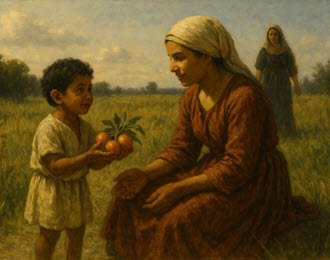Love apples for mothers
14-07-2025 - Posted by Geert-JanOriginally posted on June 10, 2025 by Andre Piet
At first glance, it’s a strange story. A little boy of about five finds some fruit in the field—love apples, as most translations call them—and brings them to his mother. What follows is a conversation between two sisters who are rivals, a nighttime exchange surrounding their shared husband, and eventually: a child. But why is this in the Bible? What does this peculiar story in Genesis 30 intend to tell us?
As so often in Scripture, the key lies in typology.
the house of Jacob: a mess—and yet a foundation
In Genesis 29–31 we read about the origin of the house of Israel. Twelve sons are born, within a period of seven years, from four mothers. Whoever expects a moralistic book presenting ideal families will be disappointed here. What rivalry, jealousy, misunderstandings, and bartering—let alone the manipulations, with the nighttime swap of Rachel and Leah as the low point.
And yet it is precisely this house that would later form the people of Israel. God writes His history not despite human brokenness, but straight through it. Is that not a great comfort for anyone who feels broken or failed in personal life, family, or parenthood?
the night of Jacob – twenty years with Laban
The story takes place during the twenty years Jacob stays with his uncle Laban. A period that, on a prophetic level, speaks of the time Israel dwells abroad, in dispersion. Twenty centuries. When Jacob left his land, “the sun went down” (Gen. 28:11); when he returned twenty years later, “the sun rose” (Gen. 32:31). A picture of the night in which Israel has found itself since the dispersion—and of the dawn that will break when they return as “Israel.”
the switching of Leah and Rachel
Jacob worked seven years for Rachel but awoke after the wedding with Leah. “And behold, it was Leah!” (Gen. 29:25). A deep disappointment—and at the same time a recurring theme in Genesis: the second becomes the first. Not Ishmael, but Isaac. Not Esau, but Jacob. Not Leah, but Rachel… or is it the other way around?
This too is prophetic. Rachel, the beloved, represents the remnant of Israel in the time when the kingdom becomes manifest. Attractive. But Leah, unattractive, speaks of the remnant during the time of hiddenness—the time in which we now live. Not the kingdom in power, but a hidden work of God among the nations. Rachel speaks of glory, Leah of what does not please the eyes. God reverses the roles.
Reuben and the dudaim – a prophetic Mother’s Day gift
It is in this context that Reuben appears. A boy of no more than five years old, son of Leah, who finds dudaim in the field—love apples. That it was “in the days of the wheat harvest” (Gen. 30:14), places it around Pentecost: the fiftieth day after the barley harvest. A day that prophetically speaks of the outpouring of the Spirit, but also of a missed opportunity for Israel. It was during Pentecost that the Spirit was poured out in Jerusalem (Acts 2), but also around Pentecost that in this same Jerusalem Paul as apostle to the nations was arrested (Acts 20:16; 22:21–22).
The love apples—in Hebrew dudaim—are more than a botanical curiosity. They are traditionally associated with fertility and love. But their name says even more: the word is related to dod, “beloved,” and appears in the name David. In fact, dudaim means: double David. Or: the second David. The beloved according to God’s heart.
What a rich typological image! Reuben finds “David” in the field and brings him to his mother. As if to say: “Look, mother, here he is—the beloved one, the fertile one, the true David.”
bartering and fruitfulness
Rachel sees the love apples and wants them. She buys them—literally—with a night. “He shall lie with you tonight in exchange for your son’s dudaim” (v. 15). Rachel thinks: thus I purchase fruitfulness. But things turn out differently. Rachel remains barren. Leah—who lies with Jacob that night—does become pregnant. She bears her fifth son and names him Issachar: “wages” or “hire.”
It is a beautiful reversal: Rachel pays, Leah receives. Rachel pursues fruitfulness, but it is Leah who is heard. Just as Israel expected the kingdom in Acts 2, but did not receive it. “Behold, it was Leah.” It seems a disappointment—but it was God’s path. He does not answer the one who pays, but the one who depends. And He causes fruit to grow where man does not expect it.
the dudaim in the Song of Songs
The dudaim appear once more in the Bible—in Song of Songs 7. There the bride, the remnant of Israel, says:
“The love apples give off their fragrance, and at our doors are all kinds of precious fruits, new and old, which I have laid up for you, my beloved.” (Song of Songs 7:13)
The dudaim ultimately do bear fruit—but only at the moment the bride finds her beloved again. “I have laid them up for you.” Rachel will eventually bear fruit after all. Joseph, Rachel’s firstborn, later appears—a picture of the risen Christ as Savior of the world. And Benjamin, son of her sorrow, is renamed: son of the right hand.
summary: from Leah to Rachel
The story of the dudaim reveals God’s path of interruption. Not Rachel, but Leah first bears fruit. Not the kingdom in power, but the hidden work of God among the nations. Not the first, but the second. But ultimately—in God’s time—Rachel too will bear fruit. The dudaim will give their fragrance. The true David will come—for the second time. And then the kingdom will be revealed. Definitively!
This article is an adaptation of this address.

 English Blog
English Blog